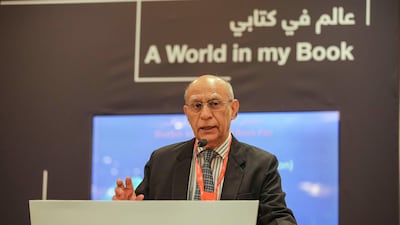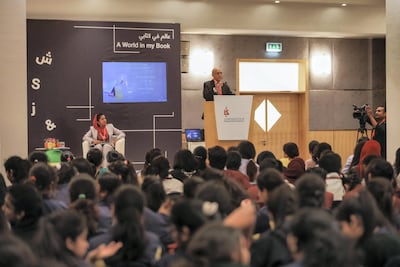Think start-ups and you have an image of youngsters putting their business ideas to work.
But Ashok Soota is not your average tech entrepreneur. At 75, he's certainly an age-defying one. Mr Soota, considered one of the Indian IT sector's pioneers, fired up the entrepreneurial imagination of students at the Sharjah International Book Fair this month on turning business ideas into reality and why now is the best time to do so.
"If you look at it, the economies of the world are largely going to be driven by entrepreneurial start-ups, by new ideas they are generating and, of course, the world is changing at such a rapid pace - it is change that is generating all these new opportunities," he said.
Mr Soota is often termed as a "serial entrepreneur" as he first led Wipro's IT business, after which he was the founding chairman and managing director of the global IT consulting firm Mindtree and led it through a successful IPO. Five years ago, he founded another next-gen tech start-up called Happiest Minds, proving that age is no barrier. Happiest Minds enables digital transformation for enterprises and technology providers through an integrated set of technologies such as big data analytics, Internet of Things and unified communications across industry sectors including retail, e-commerce, banking and hospitality.
But he was back to the basics as he simplified entrepreneurship for school and university students at the Sharjah book fair.
"The first step of any venture is that it begins with an idea. And how do you generate that idea? "
His tips included: scan the market for new customer needs; look for wide spaces between large markets where you can position yourself in the convergence of industries.
He stressed that it is important to live, breathe and dream that idea for several months and, if possible, do a low-cost market evaluation.
"The first thing with business is that it's possible that someone else comes up with a better idea. You really need to make sure your idea is defensible," said Mr Soota, who has compiled his business wisdom in a book he co-authored called Entrepreneurship Simplified.
He cited an example of how Starbucks, when entering India, found that the home-grown chain Cafe Coffee Day was thoroughly entrenched and had built a physical infrastructure comprising not just internet-enabled lounges but selling coffee in universities and offices as well - something almost impossible to replicate.
Mr Soota pointed out that an important question to ask yourself is do you want to be a first mover or an early follower?
"Everybody thinks 'I want to be the first person doing something in the world.' But when you are absolutely the first, it takes a lot of time to create a market, and a lot of money to generate that demand."
He cited examples of early followers such as how Microsoft was not the first operating system, Apple was not the first smartphone and Google was not the first search engine and how they were able to capture a market envisaged by someone else.
____________
Read more:
DIFC boosts efforts to promote growth of fintech with two new accelerator programmes
Arab start-ups key to building localised digital economy
A construction start-up well ahead of its time
____________
Now is the best time to be an entrepreneur, he states emphatically. But why?
"Firstly, there's a lot of excitement because the pace of change is accelerating and there are newer opportunities every day. The world is moving into a stage where it's no longer going to be driven by the large multinationals. It's going to be smaller companies generating new ideas, building new businesses, driving their local economies and an increase in jobs," he said.
And interestingly, he pointed out, today there's more money available chasing good ideas than the other way around.
"So you have angel investors, seed investors, private equity players, state-owned funds like you have here in the Middle East - all available to help you start your business and later grow your business."
As the founder of Mindtree and Happiest Minds, what does Mr Soota believe mind has to do with start-ups and how important is culture for a company?
"Mindtree appears in the Upanishads [ancient Hindu texts] as 'ManoVriksha' or source of intellect for those who come in contact with it and therefore focuses on the mind whereas Happiest Minds is really about happiness," he said.
The culture of a company, Mr Soota said, rests on its mission statement, five-year vision and its core values, which influence behaviour - and behaviour influences results.
"Your unique culture is something that can set you apart. When you're going through tough times, you look back and ask yourself if I am taking decisions aligned with the values of my company."
Another rule Mr Soota firmly believes in is that founders should not refer to their company as "family" unless they can really treat employees as such.
"It's common to describe companies as families. But in reality if a family finds it difficult to make ends meet, it won't fire somebody because you have to cut costs. Yet, that's what companies do all the time.
"If you're starting a business with people, it's those people who will help you grow successful and you need to help them achieve their potential as you would for your family."
Mr Soota was bombarded with questions from eager young minds at the Sharjah fair - whether it was Mehr, a student of Delhi Public School Sharjah, who asked about whether the mindset of expensive being the best was preferable to selling high quality goods at reasonable prices, or Shreya from Victoria College Ajman, who wanted tips on dealing with competition.
Having just turned 75, Mr Soota was delighted when the students sang an impromptu Happy Birthday for him. So what keeps him going?
"Firstly, I enjoy what I am doing. Secondly, dealing with young people who challenge you at all times, keeps you alive, alert and on your toes.
"What makes me happy is to help others achieve their potential while also achieving yours."


